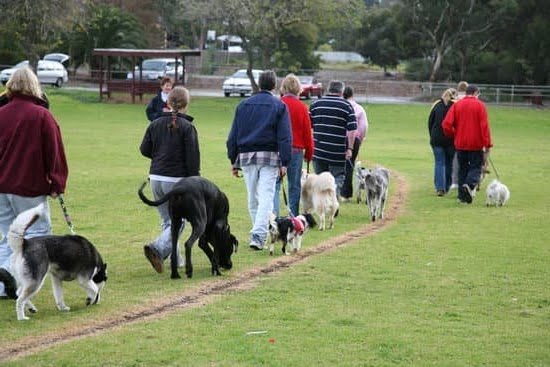Introduction
Believing the myth that you can’t teach an old dog new tricks is outdated and untrue. Even though senior dogs may take a bit longer to learn because of age-related health issues, it’s still possible for them to benefit from participating in basic obedience training classes. Bonding with an elderly dog can bring a host of benefits to both pet and human. Not only do these activities strengthen the human-animal bond through trust, understanding, and compassion, they can also help keep a senior pup’s mind active. Cognitive stimulation boosts overall mental health and could even help a senior soar above their age-related adversity.
Beyond just providing cognitive stimulation to seniors, engaging them in obedience training classes can also provide physical benefits. This is especially true for breeds that suffer from joint issues like hip dysplasia or arthritis. Simple exercises, such as those performed during training, ensure the dog stays mobile while managing any physical limitations they have due to their age. Additionally, behavior management techniques taught in class may be used safely at home as well if needed to decrease any anxiousness an aging pup might feel as a result of living with medical conditions or simply being in unfamiliar settings which are common triggers for anxiousness—like veterinarians’ offices or when meeting people they don’t know.
Ultimately, finding creative ways to engage with your aging pup is a loving way to let them know you value their presence regardless of age. With proper guidance and care, training an older dog isn’t an impossible task—it’s one that comes full circle when done with patience and understanding; one class session at a time!
Physical Exercises and Activities Suitable for Senior Dogs
Yes, old dogs can be successfully trained. Depending on the age and health of your dog, the type of training they are capable of will vary. It is important to consider any possible age-related challenges and physical limitations that may arise while training an older dog. For example, regular walks may become difficult due to reduced stamina and joint issues. In this case, adaptations such as shortening the distance or swapping walking for swimming can help reduce strain on their joints while providing ample exercise. Other forms of physical exercise suitable for senior dogs include: light obedience exercises like sitting down, staying still and giving a paw; fetching a ball or frisbee with ample rest breaks in between; playing hide-and-seek with treats and engaging them with mind games such as tug-of-war using soft fabric toys. Hiring a professional dog trainer may also be beneficial for creating appropriate individualized training exercises for your elderly pup.
Strategies to Stimulate an Older Dog’s Cognitive Development
It is possible to train older dogs, although it may take a bit more patience and effort than it would with puppies. To stimulate an older dog’s cognitive development, start by trying some fun activities that help increase their mental engagement:
1. Begin by training the basics such as sit, stay and come when called. This will set a good foundation for later exercises.
2. Include situational scenarios in your training sessions to encourage problem solving skills in your dog. For example, you can hide treats under or behind different objects and let them figure out how to retrieve them.
3. Play simple games like fetch or tug-of-war which can be mentally stimulating for your pup. Make sure to keep the challenge level appropriate for their age and capabilities; if they are having difficulty remember to keep sessions short and fun.
4. Work on tricks such as roll over, shake hands or take a bow; this kind of training will help build confidence in your pet and improve their focus and learning rate overall.
5. Use positive reinforcement throughout your training sessions; this helps build trust between you and your dog while also improving their mood through rewards.
Training Techniques to Help an Older Dog Learn Commands
Yes, an old dog can be trained and can even show much progress with the proper teaching techniques and patience. Different methods for an older dog may include breaking commands down into simpler ones, using extra positive reinforcement, rewarding with small treats to encourage practice, making sure the lessons are short but also frequent, and providing plenty of praise and companionship.
Breaking commands down into simpler versions allows the dog to focus on understanding each part rather than process large instructions. For example, if a command is “come sit stay” break it up into “come” then “sit” then “stay”. Positive reinforcement should be used liberally to reward progress and apply those commands consistently in order for it to stick in the dog’s head. Rewarding with small treats will help remind the dog which behaviors are desirable and should be repeated in order for positive recognition. The usage of treats however isn’t compulsory as older dogs will often respond well just from verbal praises or physical attachments such as petting, cuddling, or brushing. It is important to keep lessons short yet still consistent so all efforts are not wasted; this way exercises can still be tackled with joy instead of becoming overwhelming or mundane. Lastly but not least important is offering your loving affection towards the canine pal which will further encourage them in their studies while developing a stronger bond between human companion and pet. With encouragement and care, soon enough you both will achieve success in your training sessions!
Dealing With Behavioral Challenges in Older Dogs
Yes, old dogs can be trained! While older dogs may have established behaviors that can be hard to change, there are still several things you can do to help teach them new concepts and routines. With patience and consistency, you can train an older dog to overcome behavioral challenges. Start by identifying the behavior that is causing difficulty. Once that has been determined, look for ways to modify the behavior. This could be done through positive reinforcement techniques such as offering rewards for desired behaviors or providing verbal praise when something is accomplished correctly. It’s important to use consistent commands when training so that your furry friend knows what is expected of them. Positive-based methods are ideal because they are less stressful on the animal, but firmness may be necessary if the pet is proving resistant to learning. Additionally, if the problem persists or grows worse, seek help from a professional trainer or behaviorist for individualized advice about training your particular canine companion.
Strength Training for Older Dogs
Yes, you can train old dogs! It is just as important to incorporate strength training into an older dog’s regimen as it is for younger ones. In fact, it’s even more beneficial as it can help reduce achy and stiff joints and improve your pup’s strength, range of motion and mobility. Before starting any exercise program for your furry friend, you may want to consult with a veterinarian or certified animal physiotherapist to tailor the routine and make sure there won’t be any harm to their health.
The exercises should involve low-impact movement that puts less strain on the joints so focus mainly on resistance training instead of long distance running. Exercises like sit to stands, squats, steps up and down stairs and swimming are all great options to strengthen the hind quarters and core muscles which helps support older dogs’ tendons, ligaments and bones. Other exercises such as hula hooping can help stretch out the spine or side-to-side twists with a stability ball that allows your pup to twist their torso while keeping their feet planted firmly onto the ground. Taking frequent breaks during exercise sessions is also recommended so that your pup can rest in between different poses or movements. Remember never overdo it! A few minutes at a time each day will have your senior canine feeling young again in no time!
Benefits of Adopting an Older Dog Over Puppy Training
Adopting an older dog can be a great option for those looking to avoid the tumultuous stages of puppy training. An adult dog has spent time in another home, so you may be able to find one whose circumstances have led them looking for a new home. Such dogs often come with basic levels of house-training, which can make the transition much smoother from their former home and into yours. Adult dogs are also more likely to already know the basics like ‘sit’ and ‘stay’, meaning that obedience training is simpler than it is with puppies. Moreover, an adopted adult dog might even already be well versed in commands and tricks due to previous owners who had already taken the time to train them positively. Older dogs also tend to develop bond faster with their new owners due to lower expectations on both sides; as you won’t need to throw yourself into training every waking hour, nor will your new companion expect such commitment from you.
Conclusion
Yes, it is possible to train an older dog. However, there are a few considerations that need to be taken into account when training an older dog. First of all, bear in mind that an older dog’s cognitive abilities have begun to decline; their memories and response times may not be as sharp as they used to be. Therefore, they may require more patience, consideration and repetition on your part when undergoing training sessions.
Secondly, monitor the amount of physical exertion and exercise your dog receives during the training sessions. Older dogs tend to tire more quickly and can more easily become overexerted so be cognizant of when it would be best for them to take rest periods during a session. The same goes for nutrition: make sure your senior dog is receiving the proper meals with enough nutrients to keep them healthy throughout their day-to-day activities.
Finally, you should remain positive and encouraging when disciplining or reprimanding your elderly pup. Remember that their refractory period is longer so sticks may not reinforce obedience as much coo/words or a reward-based system as these methods will give them positive reinforcement rather than negative feedback which could affect their learning ability or behavior negatively. With some patience and time, old dogs can learn new tricks!

Welcome to the blog! I am a professional dog trainer and have been working with dogs for many years. In this blog, I will be discussing various topics related to dog training, including tips, tricks, and advice. I hope you find this information helpful and informative. Thanks for reading!





